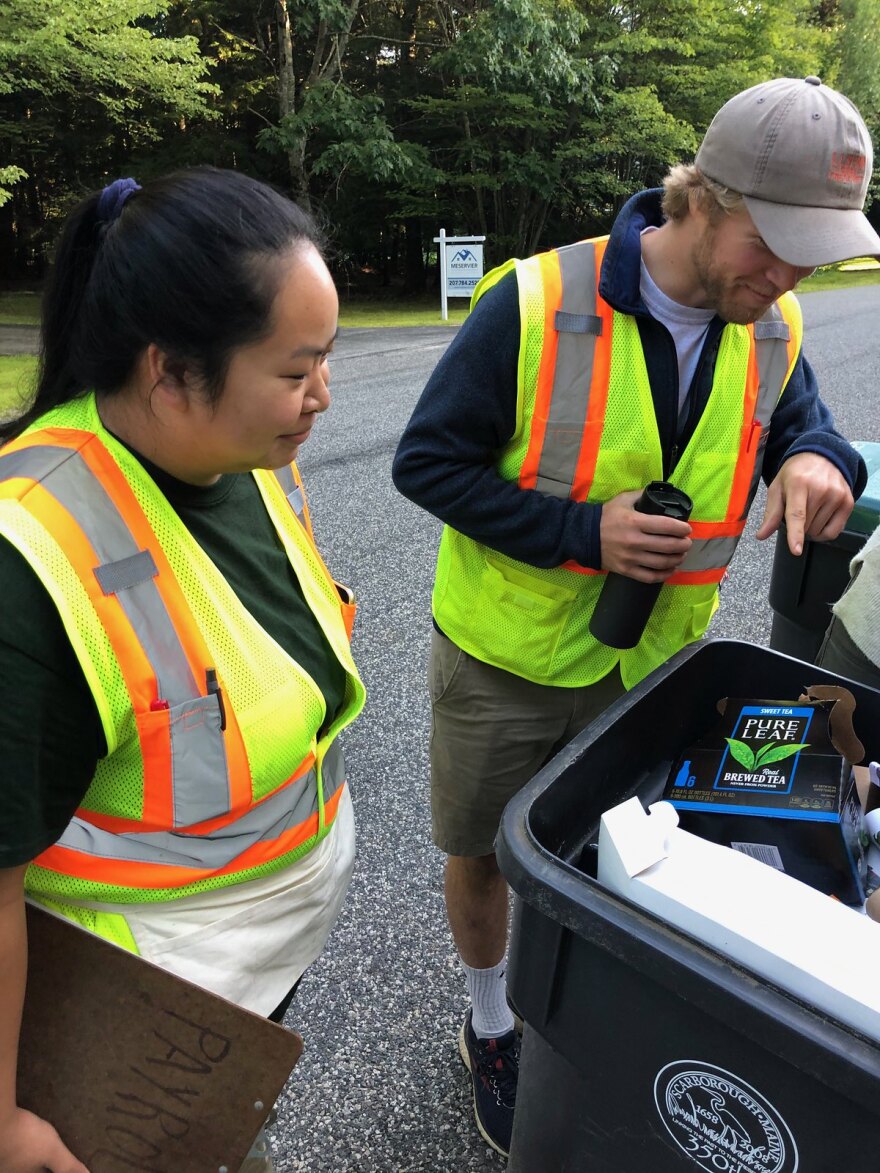One person’s trash, it has been said, is another person’s treasure — except when it comes to recycling.
A crash in the global recycling market last year is forcing municipalities in Maine to prevent household trash from contaminating their recycling streams or face hefty fees. The new added cost has led some Maine towns to drop recycling altogether.
But a handful of towns in southern Maine tried a different tactic this summer — by hiring interns to walk through neighborhoods, peek into curbside recycling bins and leave behind direct feedback on the do’s and don’ts of recycling.

On a sunny August morning, two twenty-something recycling interns are making their way through a residential neighborhood in Scarborough, where waist-high recycling bins are parked at the end of each driveway. Thorvald Arnell lifts up the lid so he and fellow intern Julie Gourlay can peer inside.
"We'll usually give a quick little peek,” Arnell says. “I see some cardboard containers, a milk jug..."
Arnell and Gourlay have been trained to look, but not touch - for reasons of personal safety, as well as the residents' privacy. They assess how many items in the bin are truly recyclable, then stick on one of three tags. If they spot one of those bubble mailers in the bin? Not recyclable. That would earn a yellow 'oops' tag. A bag of yard waste? That's more egregious, and earns a red "oops" tag. But this particular bin contains all recyclables — that's a green tag.
"It's pretty cute, it says you’re a recycling superstar," Arnell says.
While their internship is now over, Arnell and Gourlay say their job this past summer was to try to gently train as many recycling superstars as possible. They're among 10 interns who were hired by four communities — Scarborough, South Portland, Falmouth and Windham — to tag bins in certain neighborhoods each week. It was a pilot project in partnership with the waste management company ecomaine, where Katrina Bussiere-Venhuizen is a senior environmental educator.
?t=57
"The goal was to reach more folks than just, say, a brochure in the mail would,” Bussiere-Venhuizen says. “Because people can either choose to read that or not. They're going to see a sticker on a bin. They're going to see people walking down the street."
The new sense of urgency for recycling superstars was prompted by China's decision last year to close its doors to most of the world's recycling because of too much trash in the mix. Before that market collapse, ecomaine was able to sell its recycling. But now it has to pay recyclers to take it says Venhuizen, with the added cost of removing contaminants from the stream — even large and easy to spot items.

“When one person says ‘oh I’m sure this basketball is fine,’ that’s, yout know, not great, but it’s not detrimental to system,” Bussiere-Venhuizen says. “When 200-thousand people do it, and they do it with regularity, that’s a problem.”
The interns got to see firsthand the problem of what's been dubbed 'wish-cycling' during their training. They spent time in ecomaine's sorting room, where Venhuizen says they picked about 200 gallons of trash from the passing conveyor belt in just ten minutes, including everything from dirty diapers to dirty syringes.
Intern Julie Gourlay says trying to keep up with the conveyor belt was overwhelming.
“Just seeing all the things people are putting into their bins, whether it should be there or not,” says Gourlay. “I think I pulled out like a 20-pound dumbbell."
Back on her neighborhood route in Scarborough, she and Arnell encounter more common problems as they check through the curbside containers.
"Another bin here- ooh. We’ve got some goodies in here. And when I say goodies, I mean not goodies. There’s some plastic bags, there’s some wraps..."

Plastic bags, Arnell says, are among the most common recycling mistake they confront. But they do cause problems by getting tangled in ecomaine's sorting machines. This bin would get a yellow ‘OOPS’ tag.
The interns say most residents seemed receptive to their recycling feedback, usually communicated through the colored tags, but occasionally face to face.
One morning, neighborhood resident Lisa Norton slows her car as she drives by the interns. She says the tags on her recycling bin were like badges of honor, at least when they were green.
"I want to say at least four green ones,” says Norton. “I got a yellow one. We had a paper towel in there. Shame! And we were putting them up in the garage like awards. It’s been very informational."
In all four participating communities, contamination in the specific neighborhoods targeted did go down. In Scarborough for example, 52 percent of the households in the pilot project were green the first week. By the last week, that number jumped to more than 80 percent. Town-wide, the drop in contamination wasn't as dramatic, but Scarborough did see the largest decrease of all the communities, at seven percent.
Arnell and Gourlay have done their work for the summer, and now Gourlay says its up to local residents to remain vigilant.
"Now that we're done tagging, the question is, are they going to keep it up?" says Gourlay.
ecomaine says it hopes to expand the recycling feedback program to even more communities next summer.




